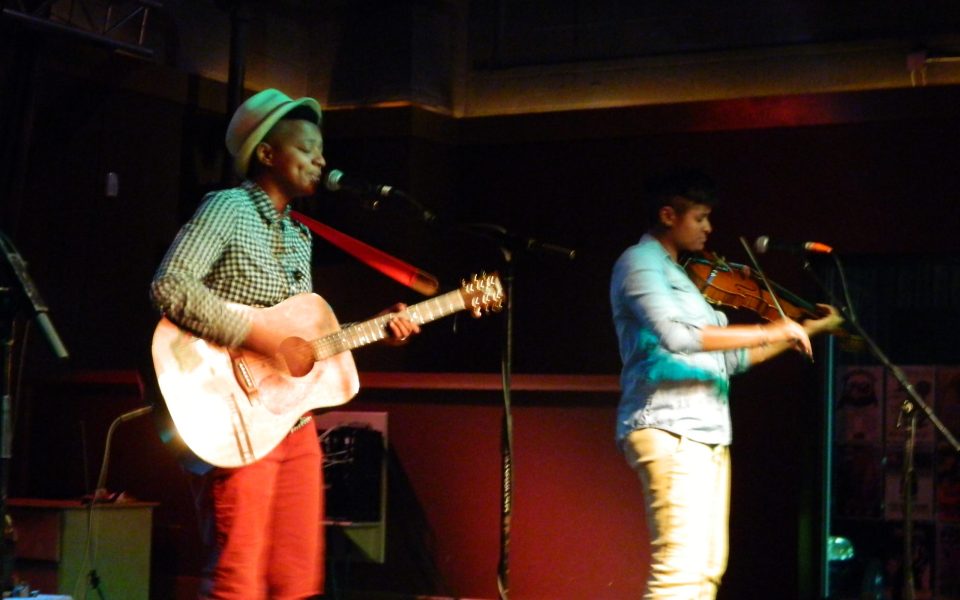by Jordan Green
This is kind of an impossible dream for Laila Nur.
It was only five years ago that the 27-year-old singer-songwriter was teaching herself how to play guitar. She learned her craft and built her audience playing at the now-closed Flatiron. Some nights she would lament that she sounded terrible, but the open-mic host, Matty Sheets, gave her constant encouragement.
“No, no, that sounded great,” he would say. “See you next week.”
She’s made one album before — a home recording of sorts knocked out within four hours when she and flautist and community activist Ed Whitfield snuck into a studio at Salem College. But this is her first properly produced and packaged CD, with supporting players contributing instrumental parts. It took about a year — “Is that a long time to put out an album?” she asks — and several times she considered giving up because of personal and financial challenges.
“I’ve had a lot of emotional struggles with my family,” she says. “That’s been a thing that I’ve been trying to find peace with. Ultimately, I realized that I have to play music to have peace. I’ve finally put that behind me and I’m ready to move forward.”
Initially, Nur resisted the idea of playing with a band, but became more comfortable with the idea through a series of one-to-one collaborations onstage at the Flatiron, including with violist Kasey Horton, she says. Tonight, Nur is unveiling her band to celebrate the release of her new CD, Pocket Change. It includes Sheets on Drums, Horton on viola and Joshua McKelvey, who produced the album, on bass. They are headlining the Blind Tiger on a Saturday night, and they have the place packed out. Oh, and it’s her birthday.
Dressed in a straw bowler, a checkered shirt and cut-offs, she greets friends effusively, sprinkling conversations with F-bombs to underscore appreciation and enthusiasm.
The two supporting acts that Nur has drafted to fill out the bill represent different poles of her vision for community and stylistic range. Amelia’s Mechanics, comprised of songwriters Molly Miller and Molly McGinn with Horton on viola, is a kind of iconoclastic folk sisterhood. The Scorchin’ Sons, a ragged rock-and-soul revue, channels Motown through white-boy angst, coming out with something akin to early Alice Cooper with a horn section or Big Brother & the Holding Company.
Nur’s own song craft and stage presence combine a confessional folk style with fiercely committed politics, filtered through her personal experience as a young, black woman who is openly gay while building an inclusive sense of community.
Nur moved from Brooklyn, NY to Virginia with her family about five years ago, and shortly afterwards moved out on her own to Greensboro, where she found a group of friends with like-minded creative and political interests. Lacking the ability to read music or knowledge of chords, she overcame her self-doubt to teach herself how to play guitar. She says that feeling out of place drives a lot of her music.
“The music is such a relief,” she says. “It’s a therapy…. It’s therapeutic to give it to people like some kind of gift. It’s the s*** I’ve been through coming out, being able to find some peace through music and healing from things that have been broken in my past.”
The Arabic music of her youth, jam rock of Dave Matthews Band, angry pop of Alanis Morrisette and righteous hardcore of Rage Against the Machine all intermix in the stew of Nur’s music.
Following the Scorchin’ Sons’ finale with a riotous cover of Ray Charles’ “What’d I Say,” Nur takes the stage and baptizes her band, opening with their namesake song, “Love Riot.”
McKelvey’s bass adds heft to the spare acoustic chord progressions in Nur’s songs, while Sheets’ drumming supplies dynamic movement under her emotive contralto.
Throughout the set, the band demonstrates an uncanny sense of when to lay back to let Nur’s voice and acoustic guitar carry the songs, and when to reinforce her by pouring on. Horton pushes herself beyond mere accompaniment on the viola, adding dashes of pizzicato when the songs need to pull back to a place of quiet expression and exploding into pyrotechnic soloing to capture energetic peaks.
A conscious party erupts on the dance floor for “Boy,” an uplifting song for transgender children that sparkles with cuddly “I love you” choruses. A woman named Nascimento joins Nur onstage to perform a song they wrote together tentatively titled “Take My Love,” with Nascimento singing the chorus and Nur rapping affectionate rejoinders.
The energetic pacing of the concert and additional guest appearances by Wise and Scorchin’ Sons trombonist Adam Collins prods the loyal audience to a kind of ecstatic devotion. And when the players leave the stage, the crowd demands an encore — the kind of star treatment local audiences don’t typically bestow on their own.
Before launching into an uproarious takedown of misogynist rappers — a song called “Bitches & Hoes” — Nur and Horton return to the stage in flying leaps. Returning to his seat behind the drums, Sheets says, “We happen to have one more song.”
Join the First Amendment Society, a membership that goes directly to funding TCB‘s newsroom.
We believe that reporting can save the world.
The TCB First Amendment Society recognizes the vital role of a free, unfettered press with a bundling of local experiences designed to build community, and unique engagements with our newsroom that will help you understand, and shape, local journalism’s critical role in uplifting the people in our cities.
All revenue goes directly into the newsroom as reporters’ salaries and freelance commissions.


Leave a Reply